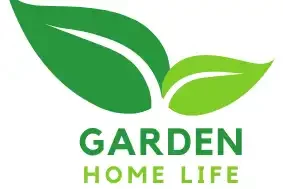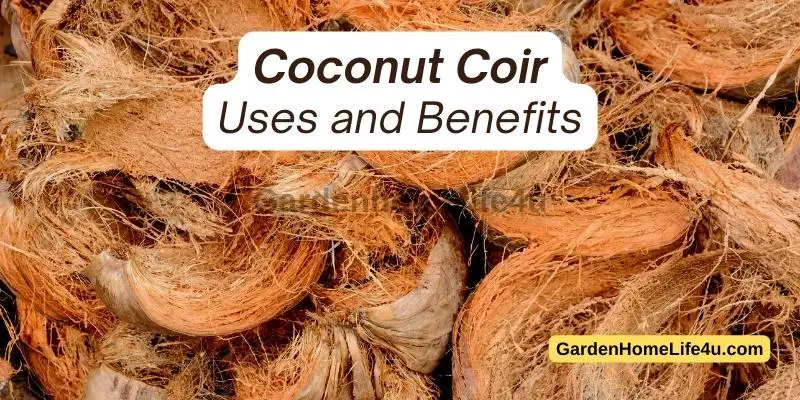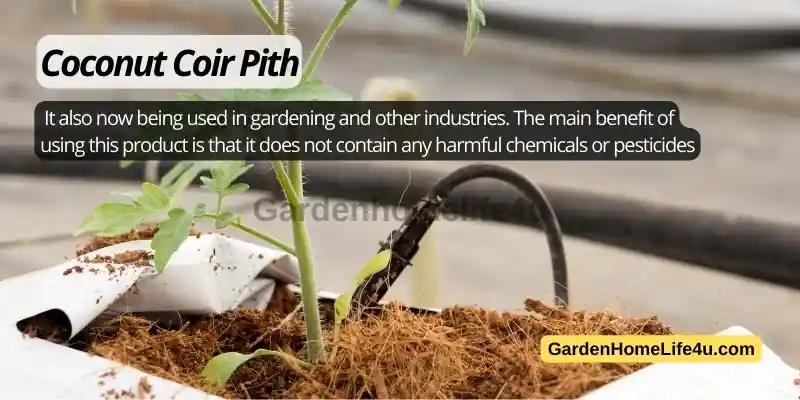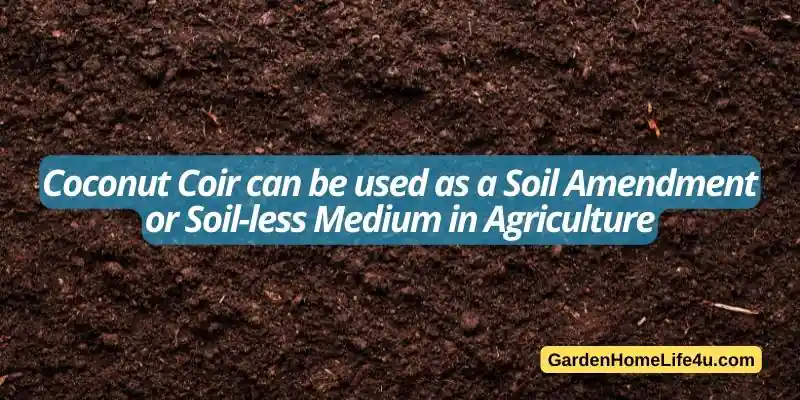Coconuts, known for their delicious water and meat, have another valuable component hidden within their husks—coconut coir. Derived from the fibrous material found between the hard shell and the meat, coconut coir offers a range of practical applications that are worth exploring. In this post, we have shone some light on the versatility of coconut coir and uncovered its various uses across different industries and everyday life. From gardening and agriculture to home decor and crafting, we will unveil the treasure trove of possibilities that coconut coir presents. Discover how this natural and sustainable material can be transformed into valuable products, contribute to eco-friendly practices, and enhance your lifestyle in innovative ways. Join us on this journey as we explore the potential of coconut coir and inspire you with its practical applications that turn the humble husk into a true treasure.
Coir is a 100% renewable and biodegradable fiber made from coconut husk. Coir fiber is also a good alternative for wood fiber and wood-based composites. The coir fiber has long been used in ropes and matting, while more recently they are used in textiles and horticulture.
Source of Coconut coir
- You can find coconut coir in the husk of the coconut.
- In simple terms, it is made from the outermost layer of the coconut fruit.
- The husk is made up of cellulose fibers and lignin.
- These make it an excellent material for ropes and other products that require strength and durability.
- Coconut coir is a natural fiber that has many different uses because of its properties such as flexibility, absorbency, softness, water resistance, and durability among others
Renewable, Organic, and biodegradable fiber 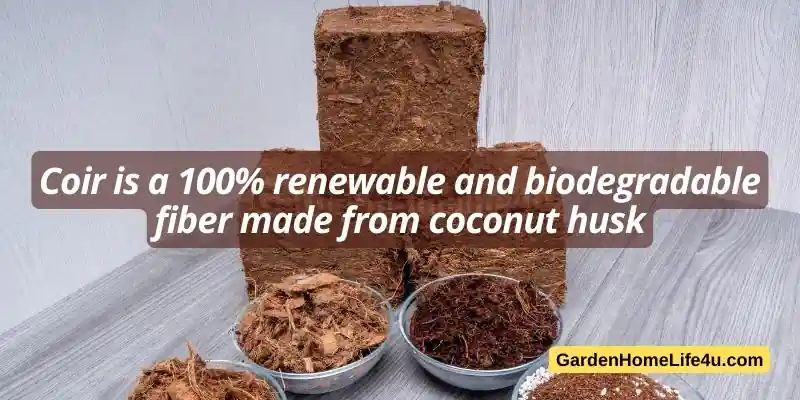
- Coir is a 100% renewable, organic, and biodegradable fiber made from coconut husk.
- It’s also called coco peat, and it’s a natural and sustainable resource that helps keep our planet healthy.
- Coconut Coir uses and benefits include the ability to retain water for long periods of time
- Less prone to fungus infections than other fibers which could be great in wet environments.
A good alternative for wood fiber and wood-based composites.
- Coir fiber is also a good alternative for wood fiber and wood-based composites.
- Coir fiber has higher strength and density than wood fiber, as well as better resistance to water absorption.
- Its thermal conductivity is lower than that of wood fiber, which means it does not absorb much heat when used in construction materials such as doors or windows.
- Coir fibers do not absorb alkali, therefore they are not harmed by long periods of contact with saltwater environments such as coastal regions or close proximity to the sea.
- This makes them ideal materials for use in marine constructions such as boats and docks where they can be exposed to salty air without deteriorating rapidly.
- Coconut coir is strong and durable, making it suitable for use in high-traffic areas.
- Coconut coir has natural moisture-resistant properties, making it an excellent choice for flooring in damp or wet environments.
- Coconut coir is a renewable and sustainable resource, making it an environmentally friendly option for flooring.
- Coconut coir provides a soft and comfortable surface underfoot, making it suitable for use in areas such as bathrooms and mudrooms.
- Coconut coir flooring comes in a variety of colors and textures, adding visual interest to a room.
Overall, coconut coir flooring is an excellent choice for those looking for a durable, moisture-resistant, and sustainable flooring option, especially in wet environments.
The Coir fiber used in ropes and matting 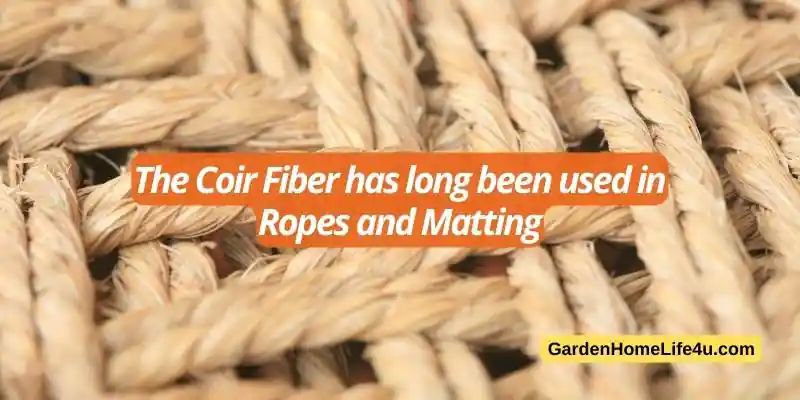
Coconut coir, made from the fibers of coconut husks, has several applications in rope manufacturing and offers several benefits:
- Strength: Coconut coir fibers are strong and durable, making them suitable for use in ropes that need to withstand heavy loads and rough use.
- Moisture resistance: Coconut coir has natural moisture-resistant properties, making it an ideal material for ropes that will be exposed to damp or wet conditions.
- Sustainability: Coconut coir is a renewable and sustainable resource, making it an environmentally friendly option for rope production.
- Biodegradability: Coconut coir ropes are biodegradable and will break down over time, reducing their impact on the environment.
- Cost-effective: Coconut coir ropes are typically more cost-effective than other types of ropes, making them a budget-friendly option for various applications.
Coir use in medium-density fiberboard – AKA MDF
Coconut coir, made from the fibers of coconut husks, has several benefits for use in the production of medium-density fiberboard:
- More environmentally friendly option for MDF production compared to traditional materials like wood.
- Coconut coir fibers are lightweight, making MDF made from them lighter in weight than traditional MDF.
- Coconut coir fibers are strong and durable, making MDF made from them more resistant to wear and tear.
- Coconut coir has natural moisture-resistant properties, making MDF made from it more suitable for use in damp or humid environments.
- Coconut coir fibers have good insulation properties, making MDF made from them better at insulating against heat and sound compared to traditional MDF.
Coconut Pith as ByProduct
Coconut coir pith is the residue of the coconut husk
- Coconut coir pith is the residue of the coconut husk that is left after the extraction of fibers by the retting process.
- Coconut Coir Pith is a byproduct of Coconut Fiber Production and its main use is as animal feed.
- It can also be used as a soil conditioner and as an organic fertilizer.
Coconut Coir Pith has been used for centuries as animal feed but it is also now being used in gardening and other industries. The main benefit of using this product is that it does not contain any harmful chemicals or pesticides, which makes it safe to use around plants.
Coconut Coir – Agricultural uses – Coir bags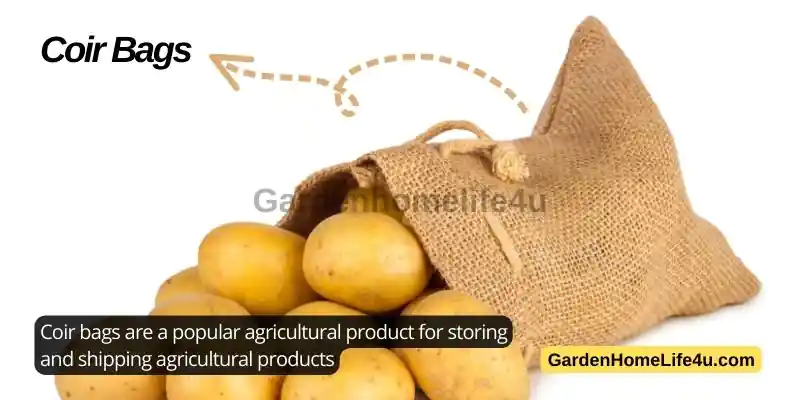
- Coir bags are a popular agricultural product for storing and shipping agricultural products.
- They can also be used for storing and transporting other products, such as sand and gravel.
- Coir is also an excellent soil amendment because it contains a high amount of organic matter that improves soil structure, water retention, and drainage, aeration, and drainage.
- When used as a growing medium in soil mixes, coir encourages vigorous growth from the plant’s roots
- it does so by retaining moisture while allowing oxygen to penetrate into the soil.
Coconut coir as Insulator 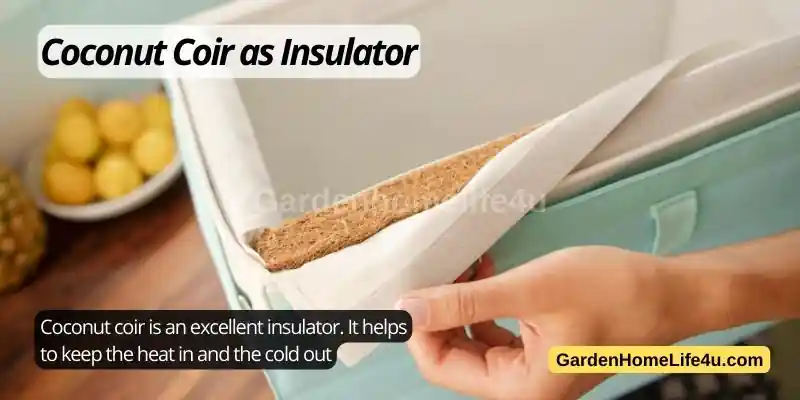
- Coconut coir is an excellent insulator.
- It helps to keep the heat in and the cold out.
- Coconut coir will help to retain moisture and keep temperatures steady even during extreme weather conditions.
- The main benefit of using coconut coir as an insulator is that it is sustainable, renewable, biodegradable, non-toxic, and affordable
It is more environmentally friendly than foam or plastic alternatives.
Coconut coir as Soil mix 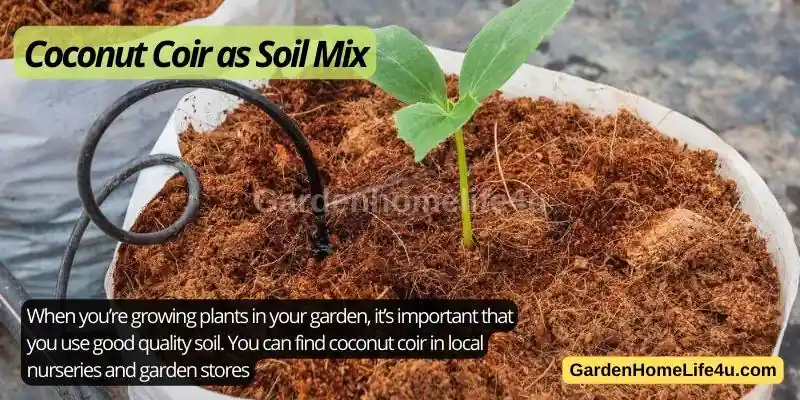
You can find coconut coir in local nurseries and garden stores.
Coconut coir is a great alternative to peat moss because it is sustainable and renewable.
Coconut coir also helps to retain water more effectively than peat moss does, which means less watering for your plants!
Coconut coir is equivalent if not better than compost for soil mixing applications.
Coconut coir as weed suppression mats 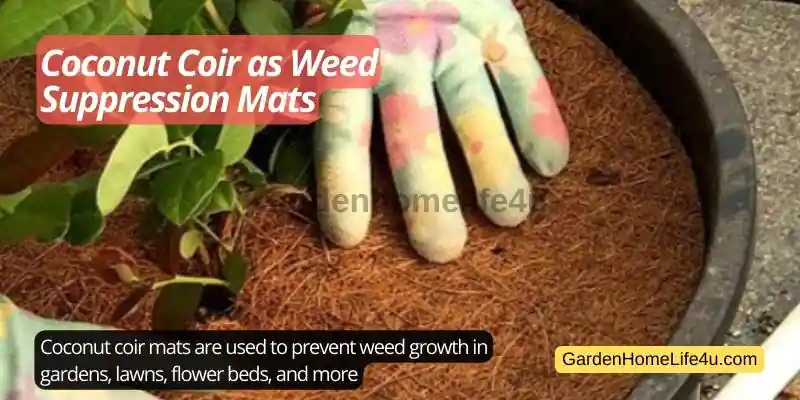
- If you’re looking to keep weeds out of an area or garden, coconut coir is a great option.
- Coconut coir mats are used to prevent weed growth in gardens, lawns, flower beds, and more.
- The coconut fiber is porous and allows air circulation through it.
- It does not have any chemicals added which could harm your plants or the environment.
Coconut coir as a Growing Medium 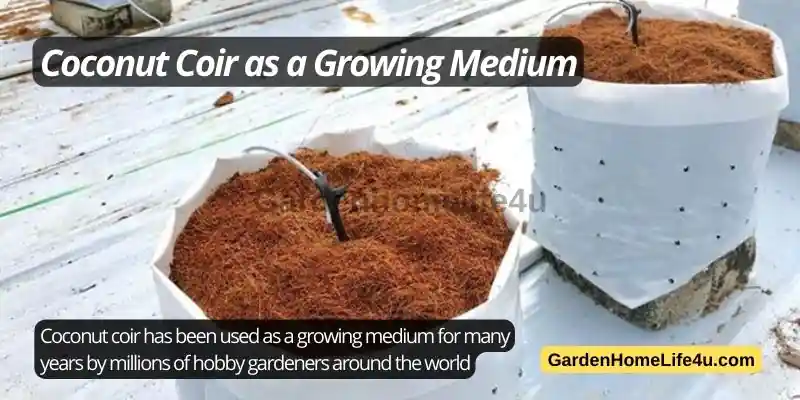
- Coconut coir is a great soil amendment, especially when combined with other materials like perlite and vermiculite.
- It provides the right amount of water-holding capacity, aeration, and drainage that plants need to thrive.
- Coconut coir has been used as a growing medium for many years by millions of hobby gardeners around the world.
- It can be used alone or mixed with your favorite composts or potting mixes to improve their performance and boost plant growth.
Large-scale use of coconut coir as a soil amendment
Coconut coir is widely manufactured and used in India.
Coconut coir is manufactured widely at the national level by thousands of small businesses installment across India, as well as widely used. its applications range from soil mixing to manufacturing ropes, bags, and all other sorts of packaging and building materials.
